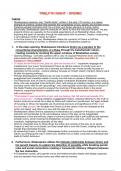Essay
A Level Edexcel English Lit - Paper 1 Twelfth Night Character Essay Plans
Includes 7 detailed A* A Level Edexcel English Lit Twelfth Night Character essay plans. I got an A* in my English Lit A-Level last year, these essay plans are perfect for revision! All reviewed by teachers, contains key quotes with deep analysis, unique context and links to AO5 critics! -Orsino -...
[Show more]




